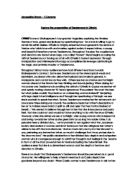The relationship between Desdemona and Othello is an integral aspect of Othello, both in terms of plot and in conveying Shakespeares socio-political commentary. The view that Desdemona is vital to her husband and in losing her, he loses
‘She is vital to her husband: in losing her, he loses himself’
By exploring ways in which the relationship between Desdemona and Othello is presented, evaluate this view.
The relationship between Desdemona and Othello is an integral aspect of ‘Othello’, both in terms of plot and in conveying Shakespeare’s socio-political commentary. The view that Desdemona ‘is vital to her husband’ and ‘in losing her, he loses himself’ is strongly evidenced by Othello’s degeneration throughout the play having an undeniable correlation with the breakdown of his marriage. Furthermore, the ‘tragedy’ of the play is Othello’s hubris forcing him to murder his wife – the action which proves his inability to integrate with Venetian society. Shakespeare presents the relationship between Desdemona and Othello in a deeply immersive way by defining it both in terms of their personal interaction, and the reaction and interference of the characters in the play. Most importantly, the antagonist of the play, Iago, uses Desdemona’s “goodness” as the net to “enmesh” Othello, in addition to his other victims including Cassio and Roderigo. Iago’s Machiavellian plot to be evened with Othello, “wife for wife” depends heavily on his ability to destroy his marriage – thus confirming the importance of Desdemona.
The status of Desdemona and Othello’s relationship as a major point of conflict is clear from the very beginning of the play – where Iago and Roderigo attempt to “poison the delight” of Brabantio by revealing that Desdemona had secretly married Othello. In terms of context, the concept of marriage without parental consent was taboo in Jacobean society, and would’ve been controversial even in Venetian society – which was considered much more relaxed than Jacobean Britain. It is also interesting to note the use of the word “poison”, which is a strong theme throughout the play – and foreshadows Othello’s eventual request that Iago “get me some poison” in order to murder Desdemona. Foreshadowing is further utilised by Shakespeare in Act II Scene I, where he has Brabantio warn Othello to “look to her Moor, she has deceived her Father and may thee”. This effect is heightened by Othello’s claim that he places “my life upon her faith!”, a moment of great irony which perfectly complements the claim that ‘in losing [Desdemona], he loses himself’. It is important to note the great trust Othello places in Desdemona in this scene and how it coincides with his confident, eloquent speech which prompts the Duke to acknowledge “this tale would win my daughter too”. The poetic blank verse which Othello speaks, and has led some critics such as A C Bradley to describe him as “the most romantic among Shakespeare’s heroes” is in stark contrast to the clumsy, monosyllabic prose which he speaks later in the play – by which point his confidence in Desdemona, and therefore himself, has been destroyed by Iago.








